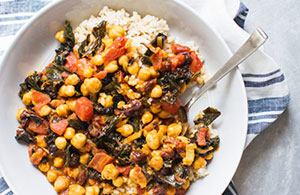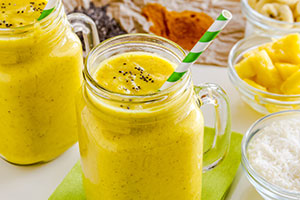|
|
|
|
 You just finished a great workout. Your endorphins are flowing, you challenged yourself to a new level, and you are proud of yourself for making your workout happen. Heading home you begin to feel a little muscle soreness. You wake up the next morning and you can barely move your legs and arms. You take a dose of ibuprofen and hope you can make it through the day.
We've all been there. While traditional remedies such as ice, stretching, massage and non-steroidal, anti-inflammatory drugs (NSAIDs) can certainly help alleviate muscle aches, the right foods can be powerful in helping increase recovery time and decrease muscle discomfort. This month I am sharing real life solutions to eating more anti-inflammatory foods that can speed up recovery and combat muscle soreness after an intense training session. |
|
|
20 Ways to Eat Combat Muscle Soreness
|
|
|
 *For practical purposes, I am focusing on four foods that are known to decrease inflammation and sharing practical food solutions on how you can incorporate more of these foods into your daily routine. Read more about these anti-inflammatory foods in this month’s article '4 Foods that Combat Muscle Soreness'. *For practical purposes, I am focusing on four foods that are known to decrease inflammation and sharing practical food solutions on how you can incorporate more of these foods into your daily routine. Read more about these anti-inflammatory foods in this month’s article '4 Foods that Combat Muscle Soreness'.
Turmeric- Make turmeric tea by adding a pinch of turmeric with fresh lemon juice to hot water.
- Try “golden milk”, a traditional Indian drink made by mixing a pinch of turmeric with warm milk and honey.
- Season your next soup or stew with turmeric.
- Roast cauliflower with olive oil and turmeric.
- Add a dash of turmeric to your morning eggs.
Pineapple- Make a pineapple smoothie with kale, pineapple, ginger, and milk.
- Add fresh or grilled pineapple to your salad, sandwich, wrap or even pizza!
- Mix pineapple with Greek yogurt as a mid afternoon snack.
- Freeze pineapple slices for a frozen “dessert”.
- Eat al natural! No need to do anything fancy, just slice it up and enjoy!
Brazil Nuts- Add chopped brazil nuts to your morning oatmeal.
- Pair brazil nuts and pineapple for a pre-workout energy boost.
- Mix chopped brazil nuts with cottage cheese.
- Make a salad dressing with brazil nut oil.
- Roast brazil nuts with broccoli and a little olive oil for a delicious vegetable dish.
Note: While Brazil Nuts have many benefits - it is important not to eat too many.
Tart Cherries- Combine dried tart cherries with nuts and a handful of dark chocolate chips for a on-the-go snack..
- Make a cherry “cheesecake”. Take a half-cup of ricotta cheese, add a drop of almond extract, mix in frozen cherries and a drizzle of honey and sprinkle with crushed nuts.
- Replace traditional sports drinks with tart cherry juice.
- Add tart cherry juice to your smoothie.
- Enjoy fresh as healthy snack or dessert!.
|
|
|
|
|
Featured Recipe
Chickpea Curry with Tart Cherries |
|
|
 Ingredients Ingredients
- 1 yellow onion
- 2 garlic cloves
- 3/4 cup dried Montmorency tart cherries
- 1 small bunch kale
- 2-15-ounce cans chickpeas
- 2 tablespoons olive oil
- 1 1/2 tablespoons curry powder
- 1 teaspoon turmeric
- 1 teaspoon ground ginger
- 28-ounce can diced tomatoes
- 15-ounce can full-fat coconut milk
- 1 teaspoon kosher salt
- 2 cups brown rice, to serve
Directions: Dice the onion. Mince the garlic. Roughly chop the tart cherries. Chop the kale. Drain and rinse the chickpeas. Heat the olive oil in a large nonstick skillet over medium-high heat. Add onion and saute 5 minutes, then add the garlic and sauté 1 minute. Add the curry powder, turmeric, and ginger and stir for 30 seconds. Carefully add the tomatoes and coconut milk. Bring to a boil, and then reduce heat to a simmer. Add the chickpeas, kale, cherries, and salt. Simmer for about 15 minutes until the kale is wilted and tender, and the curry is slightly thickened. Taste and add additional salt if necessary. Serve with brown rice. Recipe from Montmorency U.S. Tart Cherries and courtesy of Sonja Overhiser
| |
| |
|
|
"We are what we repeatedly do. Excellence then is not an act but a habit."
- Aristotle
|
|
|
|
| 4 Foods that Combat Muscle Soreness |
|
|

- Pineapple. One cup of pineapple contains 131% of your daily vitamin C needs and is an excellent source of vitamin B6 and zinc. Pineapples also contain the enzyme bromelain, which really makes them stand out as a anti-inflammatory food! Including pineapple in your regular nutrition plan not only helps combat inflammation, but it can also help heal injuries, aid in muscle tissue growth and repair, and boost your immune system.
- Brazil Nuts. These giant nuts contain a variety of healthy fats, vitamins and minerals and are associated with decreasing inflammation. In particular, brazil nuts are an high in the essential trace mineral, selenium. Selenium is known for its antioxidant properties that fight free radicals, helping to decrease inflammation associated with strenuous workouts. You can meet your selenium requirements with just one to two brazil nuts a day.
- Tart Cherry Juice. Many athletes are replacing their traditional sports drinks with tart cherry juice, and for good reason. Not only does tart cherry juice provide essential vitamins and minerals to enhance performance and speed up recovery, but it is also an excellent source of the anthocyanin. Anthocyanin is the antioxidant found to fight inflammation and reduce muscle pain and soreness. While tart cherry juice is a little more sour than black cherry juice, the anti-inflammatory properties you reap from are worth it!
- Turmeric. In the world of sports nutrition and anti-inflammatory foods, turmeric may be one of the most talked about spices on the market. Curcumin in the turmeric root is not only responsible for ts golden color, but also helps block inflammation.
|
|
|
|
|
| ABOUT SO Nutrition |  Stephanie Leipprandt Ouellette, MBA, RDN, LD
Stephanie Leipprandt Ouellette, MBA, RDN, LD Stephanie has been working in the field of nutrition and dietetics since 1995. She earned a Bachelor of Science degree in Dietetics from Michigan State University, completed an Approved Pre-Professional Practice Program at Western Michigan University and earned a Master of Business Administration from Baker College. She’s been a Registered Dietitian Nutritionist since 1996 and licensed in Texas since 2007. In 2008, Stephanie earned her certification in Childhood and Adolescent Weight Management. Stephanie has extensive clinical & managerial experience, both in corporate settings and in the community. Now she wants to share her knowledge with you, because most (if not all) nutritional habits begin at home.
Stephanie and her family reside in Katy, Texas
| |
| Copyright © 2018 Customized Nutrition Newsletters, All rights reserved. |
|
|